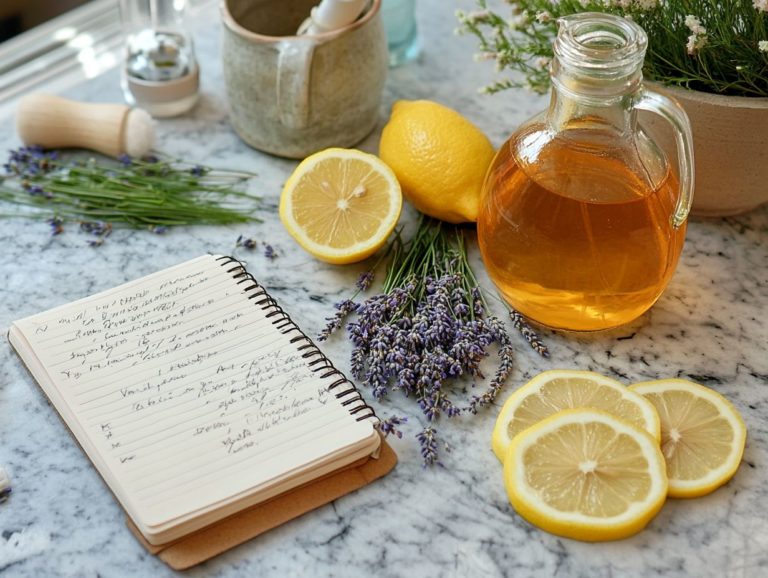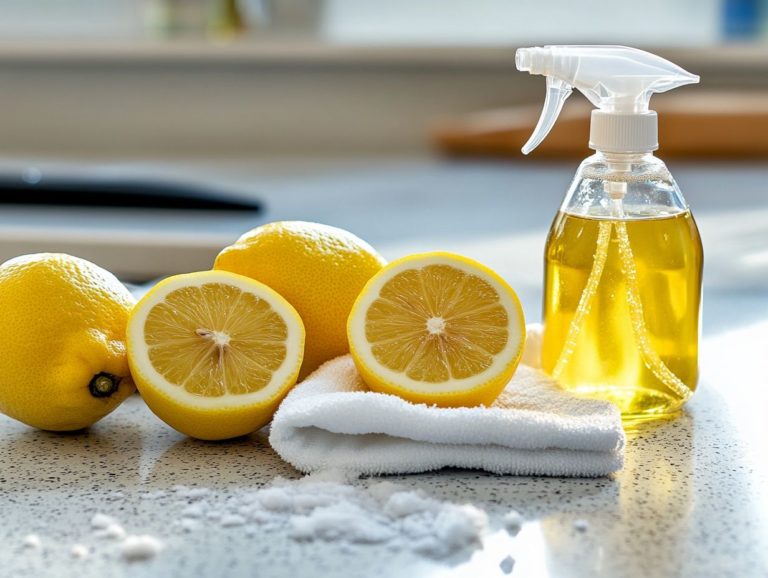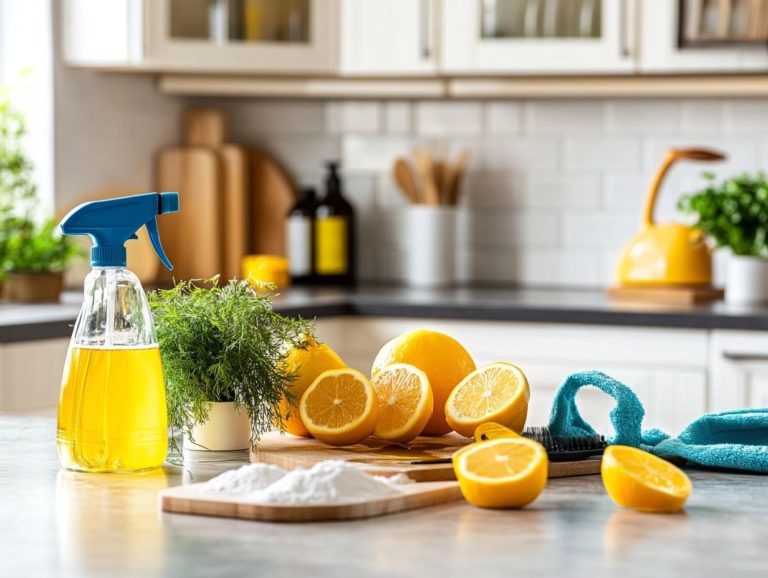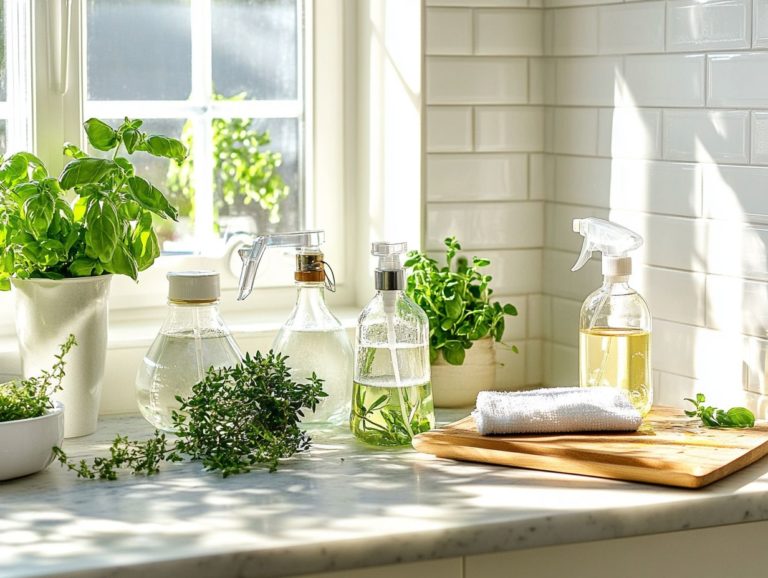Can I Use Olive Oil for Cleaning?
Get ready to discover the amazing ways olive oil can transform your cleaning routine! Olive oil is frequently hailed for its cooking benefits, yet it also possesses remarkable qualities as a natural cleaning agent for various household items.
This exploration reveals the surprising versatility of olive oil in household cleaning, emphasizing its safe for everyone properties that make it suitable for even the most sensitive skin. It is also a great option for wood maintenance and preserving vinyl surfaces.
From polishing your cherished wood furniture to tackling those stubborn grease stains that just won t budge, olive oil presents a variety of practical applications that elevate your cleaning game.
We’ll also delve into potential risks and necessary precautions, ensuring that you can confidently opt for this eco-friendly alternative to conventional cleaning products, including considering its use alongside other organic options like vinegar and baking soda.
Uncover how this kitchen staple can revolutionize your cleaning routine with practical cleaning tips!
Contents
- Key Takeaways:
- Why Use Olive Oil for Cleaning?
- Benefits of Olive Oil for Cleaning
- What Are the Different Ways to Use Olive Oil for Cleaning?
- Are There Any Risks or Side Effects of Using Olive Oil for Cleaning?
- What Precautions Should Be Taken When Using Olive Oil for Cleaning?
- Is Olive Oil a Good Alternative to Other Cleaning Products?
- Frequently Asked Questions
Key Takeaways:
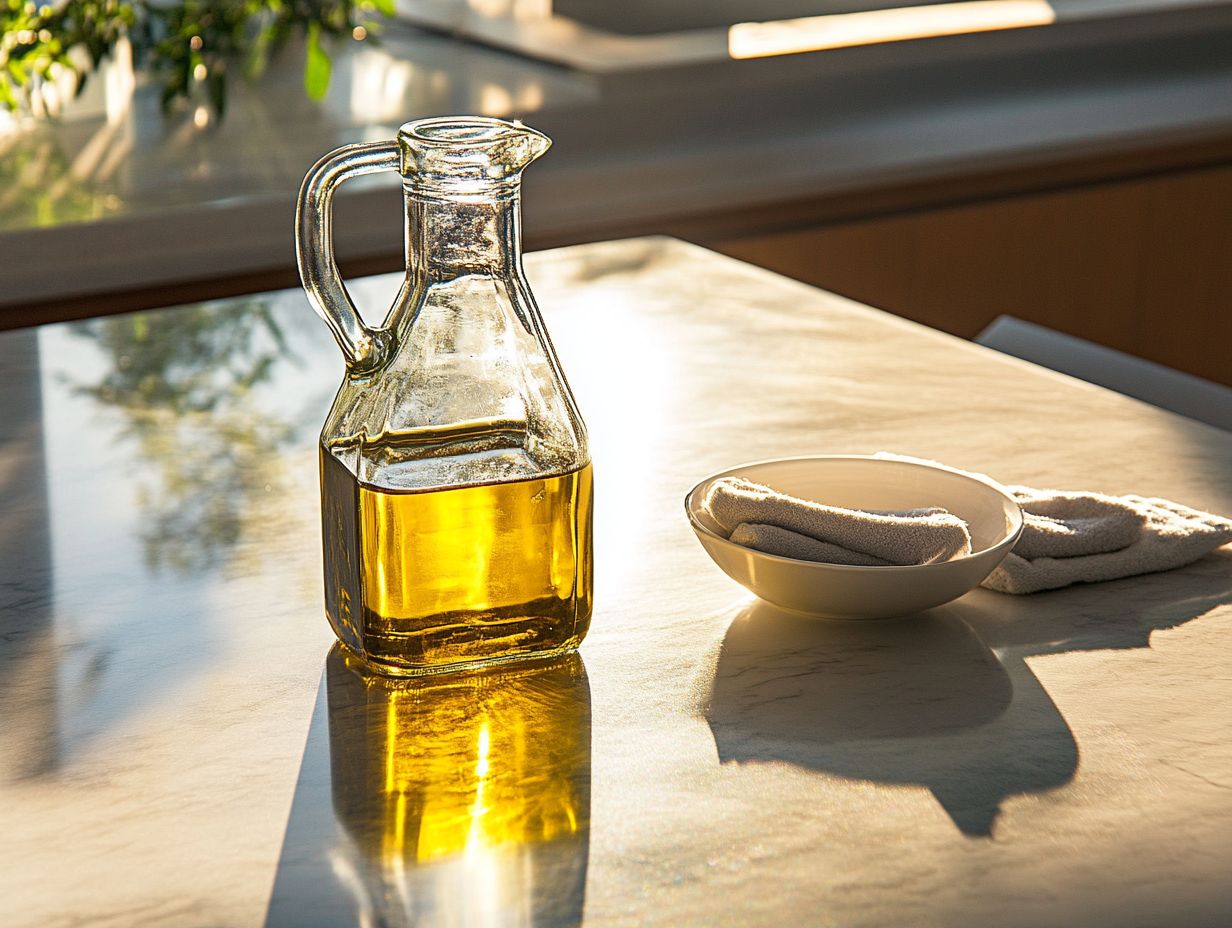
- 1. Olive oil is a natural and safe option for cleaning, making it safe to use around children and pets.
- 2. From polishing wood furniture to removing grease stains and sticky residue, olive oil is a versatile and multi-purpose cleaner.
- 3. Using olive oil for cleaning can save money, benefit the environment, and is safer for those with sensitive skin.
Why Use Olive Oil for Cleaning?
Olive oil is gaining recognition not only for its cooking benefits but also for its remarkable efficacy in cleaning a range of household items. This natural cleaning agent serves as a valuable addition to your cleaning arsenal, offering a safe for everyone alternative to traditional cleaning products.
Its versatility enables you to use it on various surfaces, from stainless steel to leather, and it’s particularly effective in tackling grease stains and preserving the elegance of wooden furniture.
The moisturizing properties of olive oil make it a great choice for using oils in your skincare routine, highlighting its multifaceted applications that extend well beyond the kitchen. These properties are enhanced when mixed with natural ingredients like shea butter and beeswax.
Benefits of Olive Oil for Cleaning
Using olive oil for cleaning presents an array of benefits that align perfectly with your commitment to effective cleaning and environmental sustainability. Unlike many commercial cleaning products, olive oil serves as a natural, safe alternative that can safely cleanse a variety of surfaces throughout your home.
Its versatility shines in tasks ranging from polishing wood furniture to conditioning leather items, positioning it as a multi-purpose solution for your cleaning dilemmas. Plus, its inherent moisturizing properties also lend themselves to skin care, transforming it into a dual-purpose product that enriches both your living space and personal care regimen.
1. Natural and Safe
One of the primary advantages of using olive oil for cleaning is its status as a natural and safe product, ensuring safety for both your household and the environment. Unlike traditional cleaning agents that may harbor harmful chemicals, olive oil comes from a natural source and is often regarded as an organic option. This means you can use it freely, even in homes with children and pets, without the anxiety of exposing them to toxic substances. Its safe nature resonates with the growing trend toward eco-friendly cleaning solutions.
In a time when health consciousness takes center stage, choosing such a versatile ingredient promotes not only safer living spaces but also underscores your commitment to environmental responsibility. By incorporating olive oil into your cleaning routine, you not only help to reduce the chemical load in your home but also contribute to long-term health benefits, minimizing respiratory issues and skin irritations that often accompany synthetic cleaners.
Using olive oil in your everyday cleaning tasks effectively combats grime while highlighting the advantages of natural alternatives, solidifying its role in the eco-friendly cleaning movement alongside other organic options like vinegar and baking soda. Experts like Halee Miller Van Ryswyk from Better Homes & Gardens suggest incorporating these natural cleaning tips for a healthier home.
Try incorporating olive oil into your cleaning routine today and see the difference for yourself!
2. Versatile and Multi-purpose
Olive oil is a remarkably versatile cleaning solution that you can use for various tasks throughout your home. It excels at polishing wood furniture, conditioning leather items, and cleaning stainless steel appliances, showcasing its extensive range of applications.
This versatility streamlines your cleaning routine by reducing the need for multiple products and elevates the process by imparting a natural shine and protective layer to an array of surfaces.
Incorporating this natural oil into your cleaning regimen offers a straightforward solution for tackling stubborn grime and smudges. For instance, when reviving wood finishes, a blend of olive oil and vinegar can transform lackluster surfaces, while a small dab on a cloth can gently buff away pesky fingerprints on stainless steel. Leather goods also benefit from an olive oil treatment that helps maintain their suppleness and prevents cracking.
These practical tips attest to the effectiveness of olive oil and highlight its eco-friendly nature, making it an ideal choice for smart homes.
3. Safe for Sensitive Skin
For those with sensitive skin, using olive oil as a cleaning agent is a gentle yet effective alternative to harsher chemical-based products. Its natural composition and moisturizing properties make it a great choice for anyone prone to irritation from conventional cleaners.
Olive oil not only cleans but also nourishes your skin, providing added moisture and preventing dryness. This two-in-one use enhances its appeal as a safe option for household cleaning.
Rich in antioxidants, which help protect your skin from damage, and healthy fats, this natural oil works wonders for maintaining skin elasticity and promoting that radiant glow you desire. When applied, olive oil penetrates deeply, soothing irritation and replenishing your skin’s moisture barrier, crucial for sensitive complexions.
Its anti-inflammatory qualities can help reduce redness and discomfort often associated with sensitive skin conditions.
Incorporating olive oil into your daily cleansing rituals offers a refreshing experience and aligns perfectly with the growing trend of choosing cleaner, more sustainable beauty practices that prioritize your skin health over artificial ingredients. This two-in-one use extends to both skincare and household cleaning.
What Are the Different Ways to Use Olive Oil for Cleaning?
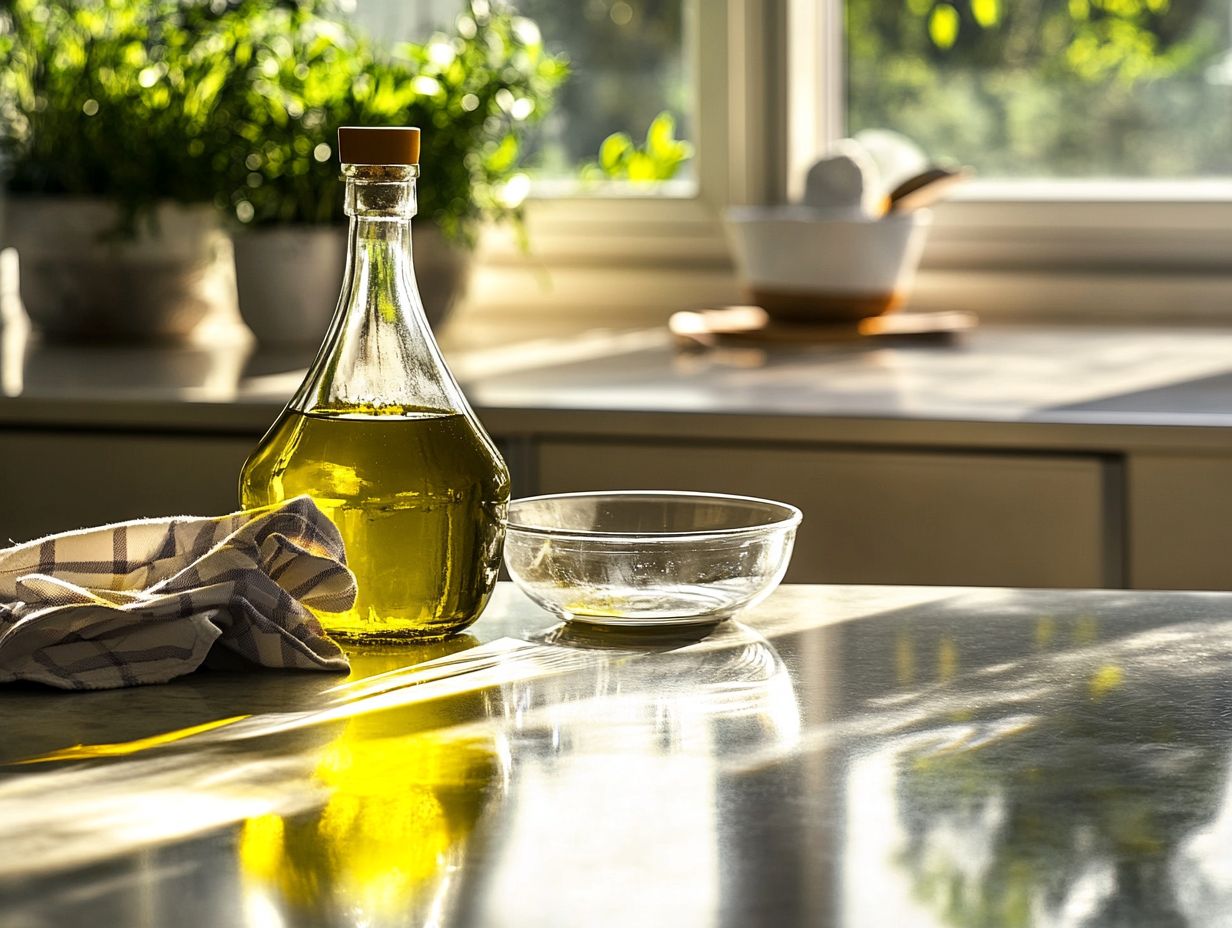
Olive oil is a game-changer in your cleaning toolkit, proving to be an invaluable asset in your household. Its innovative applications extend far beyond the kitchen, from polishing wood furniture to eliminating stubborn grease stains.
When you use olive oil on wooden utensils or leather items, it not only cleans but brings out the natural beauty of those materials. It also cleans stainless steel surfaces effectively, providing a brilliant shine without harsh chemicals.
This versatility makes olive oil an essential component for maintaining a pristine home.
1. Polishing Wood Furniture
Polishing your wood furniture with olive oil is an excellent way to enhance its natural luster while providing a protective barrier against wear and tear. By using a soft cloth, you can effortlessly apply a small amount of olive oil to the surface, allowing it to penetrate the wood and nourish it. This technique cleans and conditions the wood, ensuring longevity and a shiny finish that highlights the grain and beauty of your furniture.
To get started, gather your materials: pure olive oil, a clean soft cloth, and optionally, some lemon juice or vinegar for an extra cleaning boost. Pour a teaspoon of olive oil onto the cloth remember, a little goes a long way. Gently rub the cloth in circular motions on the wood surface, working with the grain to avoid scratches.
For the best results, let the oil sit for a few minutes before buffing with a dry cloth to maximize that shine. To maintain your furniture, consider repeating this process every few months. Keep dust at bay with a soft duster or damp cloth, and avoid direct sunlight and heat sources that can accelerate wear. With consistent care, your wooden pieces will retain their elegance for years to come.
2. Removing Stains from Clothes
Say goodbye to stubborn stains with this amazing olive oil trick! In terms of removing stains from clothes, particularly those pesky grease stains, you might be surprised to learn that olive oil can work wonders. Just apply a small amount directly to the stain, and watch as it helps break down the grease, making it much easier to lift out during washing. This natural method not only proves effective but also spares your fabrics from harsh chemicals, keeping your clothes in pristine condition.
To tackle various types of stains effectively, it’s crucial to consider the fabric type. For cotton or polyester blends, gently rub the olive oil into the stain and let it sit for about 15 minutes before rinsing with cold water. This allows the oil to penetrate the fibers, loosening dirt and grease.
For delicate fabrics like silk, use a cotton swab to carefully apply the oil, being mindful not to oversaturate. Follow up with a mild detergent and always rinse in cool water to prevent the stain from setting further. For tougher grease stains, a mixture of olive oil and baking soda (a common household cleaning agent) can work wonders.
For optimal results, always check the care label before treatment, and remember to test the olive oil on a small, inconspicuous area first. Consider using a microfiber cloth for best application results.
3. Conditioning Leather Items and Wood Maintenance
Revitalize your leather! Conditioning your leather items with olive oil is a game-changer it not only cleans but also revitalizes and protects the material, ensuring it stays supple and lasts for years. Just a small amount of olive oil, gently buffed in with a microfiber cloth, can hydrate the leather, preventing cracks and dry spots.
This technique works wonders for leather furniture, bags, and shoes, keeping them in pristine condition. Olive oil is also excellent for wood maintenance, ensuring your wooden items stay polished and well-preserved.
For the best results, you should condition your leather goods every three to six months, depending on how often you use them and their exposure to the elements. Before you dive into the conditioning, take a moment to clean the surface with a damp cloth to whisk away any dirt or debris that might interfere with the process.
It s wise to test a small, hidden area first to ensure the olive oil is suitable for your leather or vinyl items. Remember, regular maintenance like avoiding direct sunlight and excessive moisture will help extend the life of your cherished items. By following these best practices, you ll keep all your leather and vinyl products looking stunning for years to come.
4. Removing Sticky Residue
Olive oil stands out as an exceptional remedy for removing sticky residue left by labels or adhesives on various household items. By simply applying a few drops of olive oil to the affected area, you allow the oil to penetrate the adhesive, making it remarkably easy to wipe away with a cloth. This method not only lifts the residue efficiently but also avoids harsh chemicals, perfectly aligning with your natural cleaning ideals.
This versatile oil works on many surfaces, including glass, plastic, metal, and wood, making it a practical choice for addressing those stubborn sticky spots around your home. When using olive oil, it s best to utilize a clean cloth or cotton ball to ensure an even application. For delicate surfaces, consider performing a patch test in a small, inconspicuous area before proceeding.
After allowing the oil to sit for a few minutes for optimal absorption, a gentle rub will help eliminate the residue without scratching or damaging the surface underneath. This method is particularly useful for cleaning paint surfaces without stripping them. With this simple yet effective technique, you can maintain a clean, chemical-free home effortlessly.
5. Cleaning Stainless Steel and Cast Iron
Want to keep your stainless steel gleaming? Cleaning stainless steel surfaces with olive oil is your secret weapon for achieving a stunning, streak-free finish. Just take a small amount of olive oil, apply it to a microfiber cloth, and buff away on those stainless steel appliances. You ll effortlessly remove fingerprints and smudges while leaving a protective layer that resists new marks. This method not only cleans but also elevates the appearance of your stainless steel, making it a preferred choice for your kitchen.
Olive oil is also highly effective for maintaining cast iron cookware, ensuring it remains seasoned and rust-free.
Using olive oil not only cleans but also provides a healthier cleaning option. Unlike harsh chemical cleaners, olive oil is safe to use around food and family, ensuring a healthier environment.
For optimal results, remember to apply the oil in a thin, even layer and follow the grain of the stainless steel. A quick wipe with a dry cloth afterward will help get rid of any excess oil, preventing that annoying greasy residue.
To keep those surfaces gleaming, make it a habit to wipe down your appliances with a simple mixture of water and vinegar before adding that final touch of olive oil. This practice will not only keep your surfaces clean but also help preserve the shine of your stainless steel for longer. For additional cleaning tips, consider consulting resources like Better Homes & Gardens.
Are There Any Risks or Side Effects of Using Olive Oil for Cleaning?
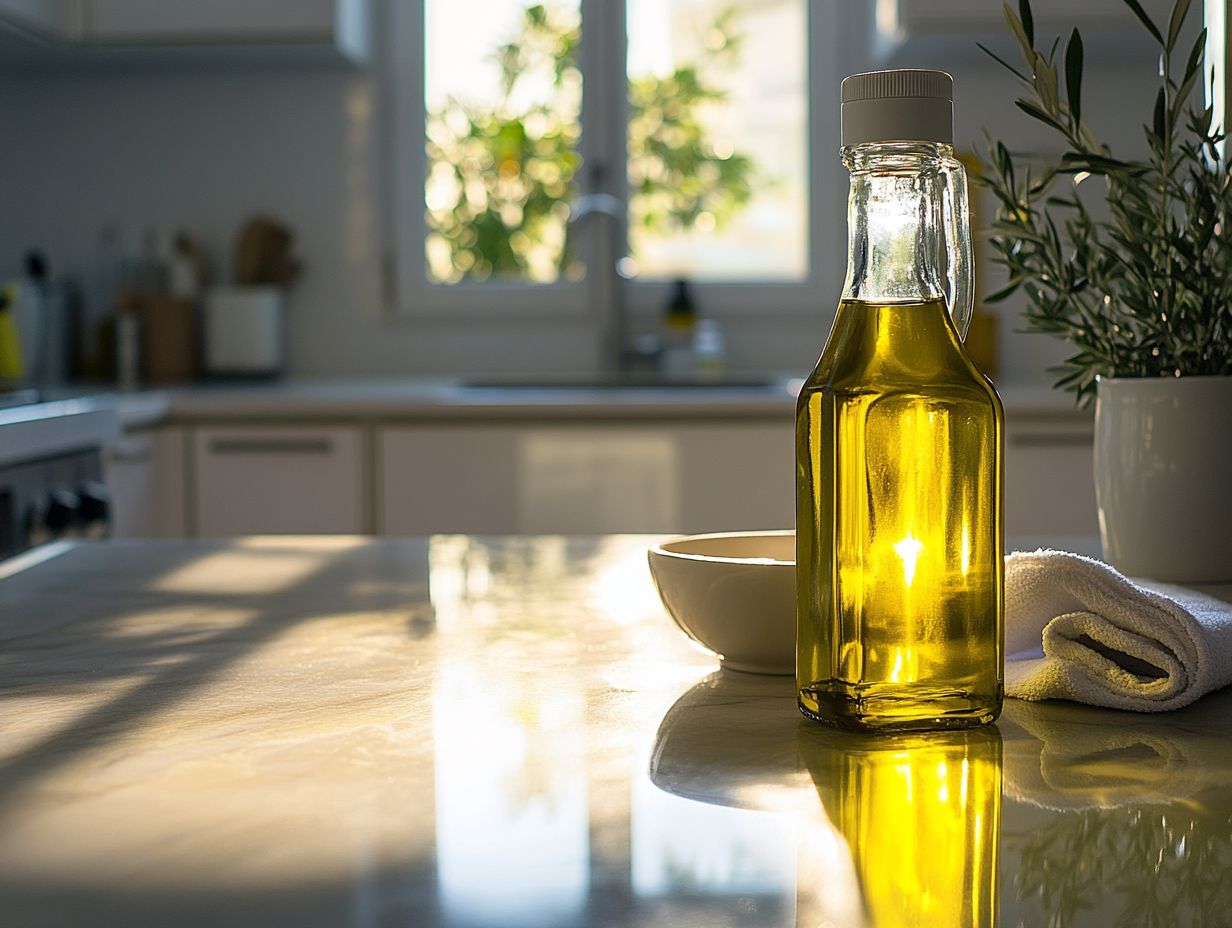
Expert advice from Halee Miller Van Ryswyk at Iowa State University suggests that while olive oil is widely celebrated as a safe and effective cleaning agent, it s wise to consider some potential risks and side effects when incorporating it into your household cleaning routines.
If not properly buffed or wiped away, olive oil can leave surfaces slippery, creating a hazard in high-traffic areas like kitchens and bathrooms. Using too much oil on certain surfaces may lead to unsightly accumulation, which can attract dirt and dust over time.
It s crucial to use olive oil judiciously and be aware of the specific surfaces you re cleaning. While it can be a miracle worker on wooden furniture, extra caution is needed when using it on tile or laminate floors, as too much oil can create a dangerously slick surface.
To reduce the risk of slips, take a moment to thoroughly buff treated areas dry with a microfiber cloth after application. By limiting the amount of oil you use, you ll prevent unwanted residue from accumulating, allowing you to maintain a safe and effective cleaning routine without compromising the integrity of your surfaces.
For safer alternatives, consider Fresh Wave products known for their natural cleaning capabilities.
Start cleaning with olive oil for a sparkling home today!
What Precautions Should Be Taken When Using Olive Oil for Cleaning?
When you decide to use olive oil for cleaning, it s crucial to take some precautions to ensure both safety and effectiveness. Start by testing the olive oil on a small, inconspicuous area before applying it to larger surfaces. This way, you can prevent any adverse reactions, particularly on delicate materials like wooden utensils.
Use a microfiber cloth to apply and buff the oil, as this will help you avoid leaving excess residue that could attract dirt. If you plan to mix olive oil with other cleaning agents, like vinegar, check if they work well together to avoid surprises.
Consider the type of olive oil you re using; extra virgin varieties tend to be more beneficial due to their superior quality. Lower grades may not deliver the desired cleaning results. You can even mix olive oil with essential oils like lavender for a delightful cleaning experience! Working in well-ventilated areas is also a wise choice, as it allows any lingering odors to dissipate quickly, making the cleaning experience more enjoyable.
Always keep olive oil away from heat sources, as it can become flammable under certain conditions. By following these best practices, you can effectively incorporate olive oil into your cleaning routine while ensuring safety and prolonging the lifespan of various surfaces. For wood furniture, consider mixing olive oil with beeswax or shea butter for an enhanced finish.
Is Olive Oil a Good Alternative to Other Cleaning Products?
Olive oil serves as an intriguing alternative to conventional cleaning products. As a natural cleaning agent, you ll find that olive oil reduces your dependence on harsh chemicals and cuts down on the waste generated by disposable cleaning products. Olive oil is also an organic solution safe for various household items.
Its remarkable versatility means you can use it for various tasks, making it an excellent choice for households looking to streamline their cleaning routines while upholding an environmentally friendly approach.
1. Cost-effective
Opting for olive oil as a cleaning agent is a savvy alternative to many commercial cleaning products cluttering the market today. Unlike those specialized cleaners that often come with hefty price tags, olive oil is easily accessible and versatile enough for a range of home cleaning tasks, making it a budget-friendly choice. This not only helps you save money but also eliminates the need to stockpile multiple products for different cleaning purposes.
Thanks to its natural properties, olive oil can effortlessly cut through grease and grime, making it an exceptional option for kitchen surfaces and appliances. Olive oil is also beneficial for skin care routines, highlighting its versatility. When you weigh the cost per use of olive oil against traditional cleaners, the savings become strikingly clear; a single bottle can replace numerous bottles of various cleaners.
Its multifunctionality allows you to not only clean but also condition wooden furniture and polish surfaces all without compromising on safety or effectiveness. You can even use it for oil cleansing in your skincare routine. Incorporating olive oil into your daily cleaning routine not only saves you money but also benefits the environment. Don t wait make the switch today!
2. Environmentally Friendly
Olive oil is a remarkably eco-friendly choice for cleaning. It stands out as a natural alternative to many chemical-based products that can harm your health and the environment. By choosing olive oil, you select a biodegradable and non-toxic solution that aligns perfectly with the trend toward sustainable living.
This decision enhances the ambiance of your home and helps create a cleaner environment by reducing the impact of harmful chemicals. You ll be amazed at how well olive oil shines your furniture! Its natural properties, including impressive antioxidant content and ability to dissolve grease and grime, make it a highly effective cleaning agent.
Olive oil works wonders on cutting boards and stainless steel appliances. It even doubles as a furniture polish, offering a polished finish without the harshness of synthetic ingredients. Its versatility is highlighted in Better Homes & Gardens as an excellent natural cleaning solution.
Using olive oil in your cleaning routine reduces your dependence on plastic packaging typically associated with conventional cleaners, which in turn helps reduce waste. By embracing this eco-friendly cleaning method, you not only cultivate a healthier living environment but also contribute to preserving our precious ecosystems for generations to come.
For more cleaning tips, consult resources from Iowa State University and other reputable sources.
3. Safer for Household Members and Pets
Using olive oil as a cleaning agent is a smart choice for your household, especially if you have young children and pets. Unlike traditional cleaning products laden with harmful chemicals, olive oil is non-toxic and safe for use around your loved ones. This quality makes it an ideal option for cleaning surfaces that come into contact with food, toys, and other household items frequently handled by curious little hands and paws.
The natural antibacterial properties of olive oil, which means its ability to kill bacteria and germs, effectively reduce the presence of germs without exposing delicate hands and inquisitive pets to harsh ingredients commonly found in commercial cleaners. Olive oil, often used in organic and natural cleaning routines, also helps with tasks like wood maintenance and oil cleansing.
For families who aim to maintain a clean yet safe home, olive oil provides a gentle but powerful solution. Its ability to condition wood and effortlessly remove grime from various surfaces adds to its charm, ensuring that every corner of your home feels welcome.
Opting for olive oil instead of conventional cleaning products champions sustainability and enhances your overall sense of well-being, cultivating a healthier atmosphere for everyone in your home. It s a natural choice that can also be integrated into skincare routines, leveraging its moisturizing properties with ingredients like beeswax or shea butter.
Frequently Asked Questions
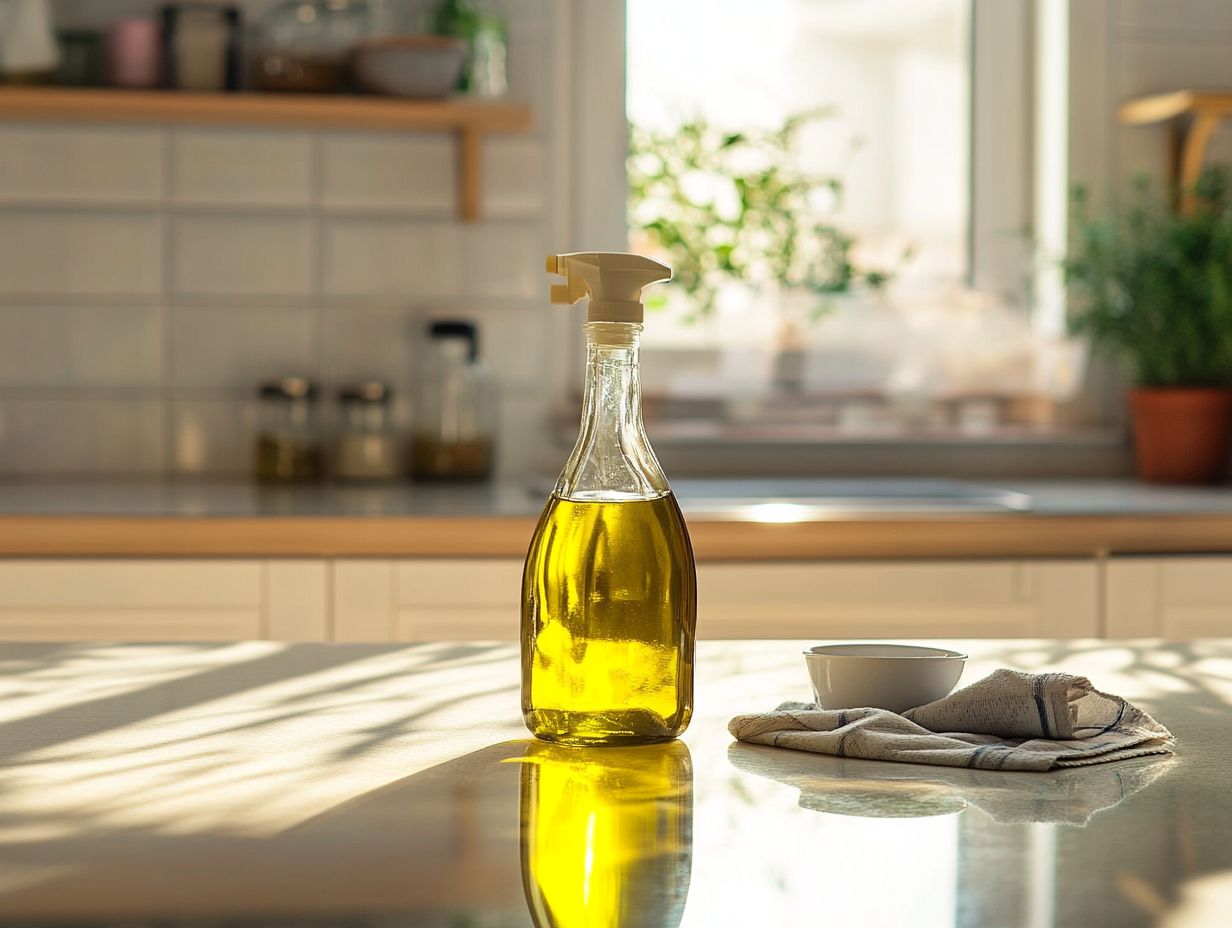
Is Olive Oil Safe for Cleaning?
Yes, you can use olive oil for cleaning, but it is best for specific tasks and should be used with caution.
What Can I Clean with Olive Oil?
- Wooden furniture
- Stainless steel appliances
- Leather products
- Vinyl surfaces
How Do I Clean with Olive Oil?
To clean with olive oil, mix it with equal parts vinegar or lemon juice. Use a soft cloth, preferably a microfiber cloth, to rub the mixture onto the surface, then wipe off with a clean cloth. This method is particularly effective for buffing and removing grease stains.
Are There Any Surfaces I Should Avoid Using Olive Oil On?
Yes, avoid using olive oil on porous surfaces like granite or marble, as it can stain or leave a greasy residue.
Try incorporating olive oil into your cleaning routine today and experience the benefits for yourself!
Discover the amazing benefits of olive oil beyond cleaning!
Olive oil is great for more than just cleaning. It can also maintain cast iron cookware and help with regular wood care.
It can also help reduce the appearance of grease stains and add a shiny finish to various surfaces.
Olive oil is a natural and safe alternative to harsh chemicals. It moisturizes and protects surfaces like wooden furniture and leather products.
Are there any precautions I should take when using olive oil for cleaning?
Don’t skip this vital step always test a hidden or less visible spot first to protect your surfaces. Use a minimal amount of olive oil and wipe off any excess to avoid a greasy or sticky residue.
For top cleaning tips, check out trusted sources like Better Homes & Gardens or experts like Halee Miller Van Ryswyk from Iowa State University.

